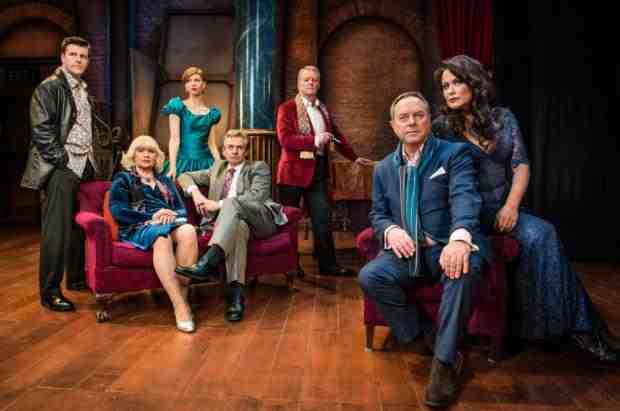@ King’s Theatre, Edinburgh, until Sat 26 Mar 2016; and
@ Theatre Royal, Glasgow, from Mon 22 – Sat 27 Aug 2016; and
@ His Majesty’s Theatre, Aberdeen, from Mon 29 Aug – Sat 3 Sep 2016
Plays about plays are somewhat self-indulgent. Plays about plays about plays are convoluted into the bargain. It’s a set-up you might just get away with as the basis of a farce. But for a murder mystery like this, it’s tortuous.
A leading lady dies on opening night after her show has received bad notices. A year later, unconvinced that it was suicide, her playwright fiancé brings the cast back together to stage scenes from a play, a play re-enacting preparations for the play they’ve just produced, as a means of getting to the bottom of what happened that night. Written down it seems contrived, on the stage, it feels more so. You want your murder plots twisty; that goes without saying. But you need them to be knotty and substantial like the roots of a tree, not wet and insipid and stretched thin like tangled cold spaghetti, or this metaphor.
Writers Richard Levinson and William Link have form writing about writing. Murder, She Wrote is theirs. But we’re not lazily watching Angela Lansbury with a cuppa on a Sunday afternoon here. The stage needs something more absorbing. This adaptation of the 1982 TV film starring Robert Preston and Lynn Redgrave isn’t it.
By the time the curtain goes down on Act One, three of the main suspects have no obvious motive for the killing, the other two have the thinnest of ones, seemingly plucked from thin air by Dennison, the accusing playwright, played by Robert Daws. The interval is therefore less a chance to discuss whodunnit than a quest to find if anyone cares. The fact that the final twist means none of this matters, doesn’t give a sense of resolution, just a sense of frustration that one has had to sit through it.
From this base, it’s hard for the production to shine. The capable cast contain strong character actors but they are given no chance to spread their wings. Dennison’s assistant (Holly Ellis) is a one-dimensional stereotype – a simple girl from the Valleys, wide-eyed and confused by London. Other characters struggle to find even one dimension, being wispy thesps of little substance. Leading man David Mathews, played by Robert Duncan, illustrates this best. Duncan’s Gus in Drop The Dead Donkey was a brilliant comedic invention – a prime example of how to draw out and exaggerate character traits to create a living, breathing whole. The character of Mathews leaves nothing for him to get his teeth into. Much the same could be said for Brookside‘s Max Farnham, Steven Pinder, here left to deal with the role of wimpy director Lloyd Andrews.
The character of Karen (Lucy Dixon) is flawed in a different way. Beginning as a Jane Horrocks template northerner, she re-emerges for the play-within-a-play as a plummy girl-about-town, claiming “I’m no longer an ingenue.” It’s a forced and irritating transition, and spelling it out makes it worse.
Simply, after ten years of touring with The Agatha Christie Company, this new Bill Kenwright venture, The Classic Thriller Company, looks like a barrel-scraping exercise. Levinson and Link are no Christie, and the difference between this and last year’s And Then There Were None is palpable. Murder mystery obsessives will no doubt lap it up, but then Midsomer Murders: The Musical would probably attract audiences.
“No one commits suicide because of a bad review,” says Dennison. I certainly hope not.
